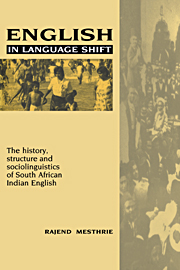 English in Language Shift
English in Language Shift Book contents
- Frontmatter
- Contents
- List of figures and maps
- List of tables
- Preface
- Acknowledgements
- List of abbreviations
- 1 Historical background: the shaping of a New English
- 2 Variation in SAIE: a first glimpse
- 3 Syntactic variation: the relative clause
- 4 Word-order principles
- 5 Non-syntactic variation
- 6 Perspectives from second-language acquisition
- 7 Perspectives from pidgin and creole studies
- Appendix A Comparison between SAIE sample and census data for Indians in Natal
- Appendix B Types of relative clauses used by individual speakers
- Appendix C Rank orders for relative clauses, topics and morphology
- Notes
- Sources and references
- Index
4 - Word-order principles
Published online by Cambridge University Press: 03 December 2009
- Frontmatter
- Contents
- List of figures and maps
- List of tables
- Preface
- Acknowledgements
- List of abbreviations
- 1 Historical background: the shaping of a New English
- 2 Variation in SAIE: a first glimpse
- 3 Syntactic variation: the relative clause
- 4 Word-order principles
- 5 Non-syntactic variation
- 6 Perspectives from second-language acquisition
- 7 Perspectives from pidgin and creole studies
- Appendix A Comparison between SAIE sample and census data for Indians in Natal
- Appendix B Types of relative clauses used by individual speakers
- Appendix C Rank orders for relative clauses, topics and morphology
- Notes
- Sources and references
- Index
Summary
Introduction
In this chapter we shall examine the main principles that govern variation in word order in SAIE, with emphasis on three striking characteristics: a high ratio of parataxis to hypotaxis; a wide range of constructions associated with a verb-final language; a high degree of topicalisation. The last of these three will be subjected to a detailed quantitative scrutiny.
Parataxis
This denotes a preference in some languages or dialects for the loose conjoining of clauses rather than the (hypotactic) use of subordination. These are to be conceived of as tendencies on a continuum, rather than absolute poles. It would be inaccurate to claim that SAIE shows a greater preference for parataxis than hypotaxis, since even the basilect shows use of a wide range of subordinating particles (for example, that, if then, etc.). Nevertheless, in comparison with most dialects of English the degree of parataxis seems significantly higher. It is not possible to give statistics here: our justification for this statement will be qualitative – showing the range of permissible paratactic clauses in the basilect.
Paratactic circumlocution
Basilectal speakers use an oral mode which favours circumlocution. In the following three examples, from three different speakers, a short pause is indicated by /, a longer pause by / / . (This notation is required since the use of commas or full stops might impose the norms of RP intonation and pause structure on the data.)
- Type
- Chapter
- Information
- English in Language ShiftThe History, Structure and Sociolinguistics of South African Indian English, pp. 101 - 127Publisher: Cambridge University PressPrint publication year: 1993


